
This review may contain spoilers
Grandma what big teeth you have!
The Wolf Brigade could have been an interesting movie about a rocky reunification between North and South Korea with politicians and civilians pulling in different directions. What we were given was a mess of a story that could never quite figure out what it wanted to be.The Wolf Brigade is a high powered, deadly force of men whose job it is to crush the sect opposing reunification. It’s not their job to care if the people are innocent or should have a voice in their country’s future. But there’s always one guy whose conscience can’t be stomped out and Lim is that soldier. This story ends up being his story of independence and redemption.
If the movie hadn’t started out with nearly an hour of what turned out to be largely confusing and at times boring exposition, I would have rated it higher. Instead it didn’t get any traction until an hour into the movie. A movie shouldn’t take an hour to figure out who was going to be the focus of the film.
After the exposition was out of the way it became a straight action film with almost zero character development or explanation yet I did become caught up in the typically unrealistic gun fights and car chases. Some of the fights did drag on too long. There was a lot of carnage.
The cinematography, sets, and costumes were all high quality and the acting was on point for this type of film.
I feel like my score is just for the second half of the movie and I should have rated it lower given the convoluted plot and lack of character development.
One character said, “We aren’t humans in wolves’ clothing, we are wolves in human clothing.” I’d have to disagree as he was giving wolves a bad name. Humans need to own their own deadly and bad behavior. And the writers needed to own their responsibility for a story that could have been much better.
12/8/22
Was this review helpful to you?

This review may contain spoilers
Whose got the weed killer and a giant fly swatter?!
Louis Koo and his production company produced Hong Kong's biggest Sci-Fi movie to date. A CGI extravaganza, Warriors of Future pits man against nature in a dystopian future not too far away.Due to man's greed and technological negligence and nearly endless robot wars, the planet's water and air have become polluted to the point of toxicity. Great domes are being built over the cities to try an give people a healthier environment. All seems to be going well when a meteor hits and a giant plant starts taking over. On the plus side, the plant is cleansing the air. Hong Kong now called section B-16 will be destroyed by the planted dubbed Pandora when the next rain hits. Carina Lau's military character is wanting to drop a bomb on the plant that will kill 160,000 people. In come Louis Koo and Lau Ching Wan to save the day by going into the belly of the plant to set off a bomb with a virus which will make the plant go dormant. No problem, right? Aside from the plants deadly ability to defend itself, it also has a host of giant bugs at its disposal. Throw in a traitorous human's evil doings and the good guys have their hands full. Phillip Keung also appears as a man in need of redemption.
The problem with Warriors of Tomorrow, aside from its obvious lack of an article (at least one "the") in the title, is that it dumps the viewer into the middle of the story. I can only guess that they thought the audience only wants to see the battles. The movie would have benefited from us feeling the relief of the domes being built along with the people and then the devastation of the meteor hitting and the giant plant erupting and destroying cities. We weren't there when the race to find a way to destroy or slow the plant was developed. Instead, we are told this information in flashback along with Koo's brief backstory and thrown right into the battle. There was little ebb and flow, just high speed, high tech fights against other tech and the enormous flora.
Koo, Lau, and Keung all gave emotional, compelling performances. Much of the rest of the cast came across deadpan and stilted. There was little humor to break up the lethal action. The CGI was actually high quality, especially for a Hong Kong film, and it's a good thing because there was a lot of CGI spectacle from beginning to end.
I actually found the movie entertaining, even if the writing let it down. It was obviously highly influenced by other films. I almost found myself quoting those films when the similar scenes popped up on the screen. I wish they'd spent as much time and money on the writing for the film as they had the sets and CGI. This would have been a far better film if they had.
In the end, who doesn't like to watch a bunch of men in metal tech take on an invasive plant species and carnivorous bugs. Anyone who has had to deal with kudzu and/or fire ants might feel the need for such superior hardware themselves. There are better movies in this genre, but for a first try it still managed to be fun.
12/6/22
Was this review helpful to you?

This review may contain spoilers
"Of all the poisons, men are the most dangerous!"
Monkey King 3 took up where Monkey King 2 left off. Aaron Kwok returned as the Monkey King along with Feng Shao Feng, Xiao Shen Yang, and Him Law. Zhao Li Ying joined them this time as the Queen of the Women’s Kingdom.Wu Kong, Pigsy, Sandy, and Tang Seng are heading west on a river when a river demon assaults them. There’s an old joke, “You can lead a horse to water but you can’t make him ski.” This was as close to a skiing horse as you are likely to see! With the help of the goddess they escape and go from the frying pan into the fire. They crash through the portal into Woman Land where Tang Seng and the Queen seem to fall in love as they plummet down a mountain. The Preceptor, a very uptight woman dressed in white, declares the men must die because they have made the cardinal sin…of being men. Men’s love is poison to a woman and it’s looking like the Queen might have been infected. She rescues them during their execution and they seek to find a way out of the spell dome over the land.
The CGI was good for the most part and there was a lot of it. Woman’s Land had beautiful dwellings and strange monsters abounded.
Aaron Kwok is the best Monkey King I’ve seen. Too bad he had very little to do in this movie. This story was more of a romance and spiritual trial than adventure. Even the “villain” was just misunderstood and hurting. Tang Seng and the Queen had to decide between love and duty as did the Preceptor. Even if you are like me and only know the story from the movies, the ending was inevitable.
I had reservations about certain aspects of the story. The one whom the Preceptor had loved during her youth was an androgynous river god. Years before because of her duty to the new queen, the Preceptor had to reject the river god who then became unproductive, obsessive and wrathful. The spirit who could cause miscarriages appeared to be a man in woman’s clothing which was played for laughs. Not very 2018 of them on either count, neither was portrayed positively. The men ended up pregnant, very pregnant after accidentally ingesting the water from the river of womanhood. Setting aside the biological issues, and regardless of your stance on abortion, there were forced abortions. Finally, though the women seem to be well trained warriors, they still had to rely on the men to solve their problems and ultimately decided maternal love was greater than romantic love. Seemed like this movie could have at least tried to give them more agency and views on loving. There were also a couple of deus ex machina moments that took the tension out of volatile, dangerous moments.
Tang Seng wrestled with wanting it both ways. He wanted the Queen and he wanted to save humankind from suffering. He believed sensual love would weaken his soul. Ultimately, he and the Queen were able to live with their decisions because they faced the problems head on and made their choices freely. Perhaps the Goddess sent him to Woman Land, because just like heartache, you can’t understand love unless you’ve felt it and lived through it.
If you are wanting to watch a movie featuring the Monkey King, this is not it. He is a supporting character to the love story. The love story was hard for me to accept as they fell instantly in love as if they’d been poisoned, knowing nothing about the other person. Zhao Yi Ling and Feng Shao Feng did their best to convince me, and it almost worked. They were lovely to look at and capable actors. Ultimately, this felt more about duty than love even if Tang Seng believed loving one was the same as loving everyone.
11/19/22
Was this review helpful to you?

This review may contain spoilers
"It pays to try" Next time try harder!
A little girl in this movie says, "It pays to try." The makers of this movie should have tried harder. For a movie about a giant tusked turtle battling a giant alien fish it was sardine-ally bad.Aliens once again come to Earth, this time a giant talking fish looking to take over the oceans because his kind had polluted the oceans on his planet. Using a striking Japanese woman under his control he kidnaps two children and their marine scientist fathers. From there the story never really jells. The kids outsmart the "spacewoman" and get them home. But she comes after them with a long chase scene through Sea World. So many things were convoluted, even for Kaiju science that I found my eyes almost getting stuck from rolling.
Suffice to say the Kaiju fights were bad and repetitive. The kids were annoying. The adults were annoying. The one dad kept saying, "That's impossible!" when the proof was right before his eyes. I wanted for someone to tell this Japanese Vizzini (The Princess Bride), "I do not think this word means what you think it means."
As much as I wanted to like this movie, Gamera deserved better. I'm not too so-fish-ticated to enjoy a ridiculous story or children's Kaiju film, it's just cod this one, was o-fish-ally a poorly made movie re-cod-less of genre, and they missed a great oppor-tuna-ty. They simply couldn't fin-ish what they started. On a scale of 1-10, this one was carp. Salmon had to say it. If this review is too punny just let minnow.
10/26/22
Was this review helpful to you?

This review may contain spoilers
In order to exorcise ghosts, you have to redeem yourself first
What is real or unreal? Supernatural or natural? Normal or abnormal? All of these things get blended up in a pseudo-psychology and poured down the rabbit hole.If you are looking for a ghoulish horror drama--look elsewhere, this is more like the Ghost Whisperer as far as the ghosts are concerned. If you are looking for accurate therapy procedures--run for your life. It's mentioned several times that the Taiwanese don't have much use for psychologists and therapy and this drama would make any psychologist or pysch student roll their eyes. If you can get on board with this particular world building, it was an oddly entertaining romantic drama with horror elements.
Sung Yen is a psychiatrist who had been working in the US, but returned to set up shop in Taiwan where his girlfriend of seven years lives. She's ready to push ahead with marriage but he's dragging his feet. There were several stories that I found interesting, especially the one where a woman is possessed by a dead man. The actress, Ying Shiuan Hsieh, gave a compelling performance as a male gangster and a gentle woman. After Sung Yen's confrontations with the possessed woman, strange ghosts begin haunting his office. Instead of doing the normal thing and vacating the premises, he decides to counsel them and help them move on. Not all is what it seems with the good doctor though as he discovers. In helping others, he helps himself.
The drama could wander around a little too much in the middle and then found itself racing to the ending. The storylines were tied up in a satisfactory way if not believably. The romance was the weakest element of the drama for me even if it was the string that tied everything together. At just 6 episodes this drama kept my attention and I enjoyed the ghost therapies. If you are sensitive to certain triggers please read the tags carefully as there are several. I can't give Green Door a green light, but I could say if you run across this drama on Netflix, I'd give it a yellow light and advise to proceed cautiously to see if it's something you might like.
10/19/22
Was this review helpful to you?
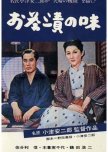
This review may contain spoilers
"Everyone has something that's been ingrained"
Director Ozu once again took on a strained marriage with a shrewish wife and docile husband, this time succeeding for me over "What Did the Lady Forget?" which had a similar theme. He'd wanted to film this during the war, but the censors shot him down and he had to wait 15 years to bring it to the screen. I'm glad he held steadfast.Taeko and Mokichi were an arranged marriage and have been together for several years. Taeko comes from a higher social class and calls her husband "Bonehead" to her girlfriends. His casual social manners and delights grate on her nerves. She has a cook and housekeeper making her a woman with nothing to do except gossip and hang out with her friends. All she wishes is for him to go away never realizing how good she has it. Mokichi is a diligent worker and respected at the office, but he doesn't live there. He's kind to others and to Taeko no matter how rude she is.
The match that lit Taeko's powder keg turned out to be her niece. Her sister had arranged a marriage for Setsuko with the son of a prominent family. Modern Setsuko steadfastly refused to participate in the "primitive" arrangement causing consternation for Taeko, especially when it looked like Mokichi was taking the 21-year old's side. At that point it was war and she refused to speak to her husband unless it was to berate him for pouring his miso soup on his rice to eat "like a dog". With the dissatisfaction she felt in her own marriage, the possibility of Setsuko being forced into an arranged marriage only magnified her pain.
Everything turned around when Mokichi had to take a short notice business trip to Uruguay and Taeko refused to show up at the airport to see him off. In a time when this was an event, all of their friends did show up to send her husband off. As she came home to the empty house, the silence and his absence sank into her. She'd gotten her wish but her body language showed it might not have been what her heart really wanted.
Mokichi returned that night due to plane trouble. She asked what he wanted to eat and he requested Ochazuke, green tea over rice. Ozu created an oddly intimate and endearing scene as the couple go to the kitchen together and step by step put the dish together, neither familiar with the kitchen. Each addition and discovery in the kitchen as they prepare the dish becomes a revelatory experience for the two as husband and wife. Taeko who has been fueled by bitterness and rage has softened. Mokichi's gentle presence no longer a blight but a balm. His kindness and acceptance of her seems to finally sink in and soothe her, his reliability and constancy finally acknowledged for what it is---love.
As I stated, this story was one that Ozu held onto for over a decade. It's also interesting to note that one of his favorite meals was green tea over rice. In the film the two young people eat ramen and wax poetic about it, another favorite of his. The sets and composition of the frames were classic Ozu, intricate care given to every prop and shot. As he did, much of it was filmed from the mat so to say, with only one annoying thing for me-often the characters would look directly into the camera to speak when they were having conversations, and I found it highly distracting. Instead of playful, heated or intimate discussions, suddenly they reminded me it was a film by looking at me to speak.
Kogure Michiyo had the perfect face for this Japanese Kate (Taming of the Shrew). She overflowed with anger and resentment with only her husband to blame, unable to look anywhere else until it was so quiet she finally turned inwards. She also had help from a girlfriend, the kind every girl needs, who called her on her brutish behavior. Kogure went from raging 4 alarm fire to beautiful golden ember. Saburi Shin gave the warm performance of a man who took life and his wife as they came, always seeking comfort from the common.
The Flavor of Green Tea Over Rice had comedic and even exasperating moments. Ozu definitely made the married couple earn their happily ever after and I believe they finally found a way to relate to each other with kindness and understanding. As a viewer who became exasperated with Taeko at times, Ozu caused me to earn the enjoyment I finally received from this comfort food of a film.
"I've finally understood a sense of ease that brings greater comfort, without reservation or appearance." (Taeko) The husband and wife is the flavor of green tea over rice. (Mokichi)
10/12/22
Was this review helpful to you?
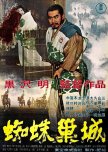
This review may contain spoilers
Oh, what a tangled web we weave...
The legendary team of Kurosawa Akira and Mifune Toshiro tackle Shakespeare's Macbeth in Throne of Blood. While hitting most of the bard's main beats, Kurosawa takes the murderous couple to feudal Japan in this highly stylized film.Mifune plays Washizu (Macbeth) caging the frenetic energy always just below this actor's surface. Washizu and his friend Miki are returning to their lord's keep, aptly named Spider Web Castle, after defeating an opposing lord's army in battle. Lost in the woods, they come across a ghostly forest spirit who foretells their future. Washizu will become the next lord of Spider Web Castle and Mizi's son will become it's future lord. Both men are incredulous as they make their way to the castle through the fog, even more incredulous when the prophetic events begin to come true.
Washizu becomes the leader of the North Garrison where he and his wife (the talented Yamada Isuzu) live a comfortable life. Lady Washizu is not content though and stirs up feelings of ambition and dread in her husband telling him that the lord may seek to kill him seeing him as a rival, especially if Miki tells of the prophecy. Washizu is not convinced but when the lord ominously drops into their hands, it doesn't take much convincing from his wife to perform the murderous deed. Miki throws in with him out of his own ambition or pragmatism. The prince and Noriyasu (Kurosawa regular-Shimura Takashi) flee to their old enemy and make a pact with him.
Lady Washizu unrelentingly keeps up the murderous whispers until man after man is slain in order to keep their new status. Even as they work to stay on top, the doubts and guilt begin to build until the subtle and not so subtle signs of madness begin to creep in. With each passing day his men's doubts grow as does the strength of their enemy.
There is all sorts of imagery in this film starting with Kurosawa's trademark wind and rain ushering in dark changes. Fog blinding the men as they try to find their way ushers in chaos and uncertainty. Washizu and Lady Washizu act almost as if they are wearing masks. She barely moves and when she does it usually means someone is about to die as the only sound you hear is the rustling of her silk dress as it slithers across the floor. At the end when the opposing army shows up, they are highlighted in sunlight while Washizu always seems to be in rain or fog or dim, claustrophobic lighting. The name Spider Web Castle reflects the deadly web the couple find themselves in, one they cannot extract themselves from.
The forest spirit tells Washizu and Miki,
"Human beings are so strange,
they are terrified to look into
the bottom of their hearts."
Washizu, his wife and Miki end up looking into their hearts and find more darkness than they were aware of. Paranoia drives Washizu to have his best friend murdered and see treachery all around him. The spirit's prophecy causes the chaos that sinks into a man's soul inciting greed and winning at any cost to take over. Was the spirit prophesying or setting events into motion with the prophecy? Did the men act of their own will or were they victims of predestination?
The sets were amazing. Always looking for that perfect shot, Kurosawa didn't like the initial castle set and had another imposing one built on Mt Fuji. In two different scenes, especially the final one, it didn't take much acting to show fear when arrows were being fired as they were really being shot at the actors.
Kurosawa wasn't afraid to use silence and time to create tension in scenes, something rarely used in today's films. The scene with the silent castle as the troops slowly approached not knowing if they would receive a welcome or death was particularly powerful.
Wind and fog come again at the end of the film along with the chorus, reminding the viewer that desire and fate are never changing. The castle of delusion is never far away when one gives into the baser ambitions at the bottom of their hearts. Throne of Blood uses no iambic pentameter, nor Shakespearean quotes, maybe it's the stronger for it.
9/29/22
Was this review helpful to you?

This review may contain spoilers
"If I see Wang, I'll be sure to tell him"
Director Zhang Yi Mou ventured onto the wild side when he remade the Coen Brothers debut 1984 noir film, Simple Blood. Instead of 1980's Texas, Zhang took the story to the Gobi Desert in ye olden times. Instead of a black comedy, A Woman, a Gun, and a Noodle Shop (WGNS) bounced from slapstick comedy with bucktoothed and cross-eyed characters to multiple murders. At times the film was entertaining and at others confusing with only the saturated colors and beautiful shots of the desert reminding the viewer of the amazing director at the helm.At Wang's Noodle Shop in the middle of the desert, Wang's wife, unlike the other characters was given no name, buys a gun from a flamboyant Persian salesman. She was sold as a wife to the miserly and sadistic owner 10 years earlier and she's carrying on an affair of sorts with Li, the bartender. The two goofy noodle cooks haven't been paid in months even though the dastardly Wang sits in his room counting his money.
As evil as Wang is he meets his match with Zhang, a police patrol officer, who sells him the news about his wife's affair. Wang offers him more money to murder the adulterous couple. From then on the film becomes entertaining as double crosses, triple crosses and riders crisscrossing the desert with bodies cause great upheaval in the small shop.
I'm not here to compare this with the Coens' film as I have only read about it, but knowing the Coen films, I suspect it was much darker and more gruesome than this farcical murder story. If perchance I watch Simple Blood, I will amend this review. As a film in its own right WGNS had some laugh out loud moments. Because most of the characters were deeply flawed and caricatures, it could be hard to care about their outcomes.
The costumes were outlandishly loud with the exception of Wang's costume. Zhang's electric indigo and black uniform was one of the most subdued. It felt like Zhang Yi Mou also overcooked some of the scenery shots-the skies glowed bright blue- they came across as almost comic strip in style. There were some gorgeous shots of the striped desert, but there were also some shots that looked like he used a fisheye lens as they were rounded on the sides or stretched too far. If all of these things were to remind us that this was just make-believe he succeeded rather well.
Yan Ni had the tough job of selling the shrill adulterous wife. I couldn't find Wang's wife loathsome though, she was a woman stuck in the middle of nowhere perversely tortured by her husband with the scars to prove it. That she was in need of comfort and hoping to divorce him seemed reasonable in her situation. She came across more nuanced than either her dim-bulb lover or her repulsive older husband. The two cooks were there strictly for comedy relief. A rather acrobatic noodle making session between them was fun though. Sun Hong Lei as the greedy and murderous Zhang had almost no lines, but conveyed his observations and reactions all through slight facial and body movements.
Having watched my share of Chinese films, I could find the humor in the story and realize that slapstick is all part of it. More people fell down in this movie than a female lead in a romantic Kdrama. Watching it free from prejudice regarding the original and judging it on its own merit, WGNS had some entertaining moments. It was a strange and nihilistic morality tale of greed and lust, told in vibrant colors despite its dark underbelly. As a fan of Zhang Yi Mou's films I do have to admit it was a bit disappointing. I expect better from this director. I guess everyone has to try something out of their comfort zone at times-A Woman, a Gun, and a Noodle Shop was probably out of his and mine.
9/23/22
Was this review helpful to you?

This review may contain spoilers
"Getting what we want and happiness aren't always related"
Ostensibly The Four 2 is a wuxia film, and if talking a person to death qualified as a martial art then this movie would fill the bill. The first half was composed of dull dialogue and drawn out exposition, most of which led nowhere. There was a murder "mystery" that didn't do anything to liven up the story. Thankfully, the second half did the heavy lifting and upped the action and emotional conflicts.The Four 2 sort of picked up where The Four left off, leaving a couple of key plot points unanswered and glossed over.
When a movie is titled, The Four, it would seem like it should focus on The Four, but with the large cast and erratic story, the team never seemed to be a team and much time was focused on other characters. They were more like the four acquaintances who occasionally bump into either other or argue with each other over whose turn it was to pick the restaurant. The Big Bad didn't seem particularly menacing. He may have caused problems with the team but nothing impossible to overcome.
Once the second half begins, the action starts which is good. Because even after 3 hours at this point the character development was sorely lacking. The romance between Cold Blood and Emotionless was pretty emotionless and cold. The fights were dramatic and the CGI wasn't horrible. The action at least involved most of the characters and if the story wasn't moving forward very fast at least the characters were moving. Some sets were better than others, a few looking rather low budget with the CGI filling in the gaps as people fled and fought. As the fights rolled on and secrets were revealed, the movie finally became interesting. Then it simply ended after a revelation.
The people were pretty and the production values were fine. I actually enjoyed the OST, something I rarely even notice. What let me down was the less than stellar dialogue, uninteresting characters because they often weren't doing anything important, and the long dragged out first half.
I love wuxia films. Bring out the swords and poison darts, the super leaping and qi power. But one thing a wuxia cannot be is boring. Even a rapier wit would have been welcome in the first half of this movie. Being the middle child is never easy in a movie trilogy but oftentimes the second film is the deeper, darker, more emotionally involved story because the characters are established and the stakes heightened. The Four 2 failed on all accounts for me.
9/19/22
Was this review helpful to you?
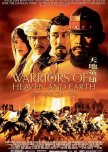
This review may contain spoilers
Know the rules of The Road
Warriors of Heaven and Earth is an unconventional action and buddy film. Filmed in the Gobi desert with a haunting OST and good performances, this film had almost everything needed to be epic. Almost.Unlike many films with numerous plots and turns, Warriors of Heaven and Earth was more like the Silk Road going through the desert. A rough path with even rougher people traversing it, but fairly straightforward. The film starts with Lai Xi, a Japanese man, who came to China 15 years before to study war craft. All he wants to do now is go home and see his mother. The emperor, whom he is loyal to, has resisted letting him leave. The Tang emperor tasks him with eliminating fugitives in the Western region. Once he fulfills this task, he can finally return home to Japan. Lai's final obstacle is hunting down "Butcher" Li, a general charged with mutiny because he refused to slaughter captive women and children.
Lieutenant Li has been wandering the desert making a living when he is caught up in a sandstorm and nearly dies. He is rescued by the sole military survivor of a caravan carrying Buddhist texts and a precious artifact. One young monk protecting the artifact survived the storm as well. Li takes control of the caravan and promises to lead it to the capital. Along the way he ends up picking up a fighter who had seen too many winters, Old Diehard, and a young man who had seen too few, Salamander, as well as some of his old cohorts. Lai Xi also finds him and after a fight that ends in a draw agrees to allow Li to finish the caravan mission before killing him. For some reason, Lai is escorting the daughter of a killed general to the capital and she becomes part of the caravan as well.
No movie focusing on the Silk Road would be complete without gangs of bandits. This film focuses on Master An, the leader of a gang determined to steal the artifact. Another group, followers of a Khan, also want the artifact. They are relentless and seemingly willing to sacrifice anything to get their hands on the item in the monk's care.
Li and Lai have an almost comfortable relationship as two men who see each other as equals, and honorable, though they know at least one of them will not reach the capital. The small band of men, almost akin to The Seven Samurai, must use every bit of their wits and experience to fight through the bandits in inhospitable territory. Outnumbered and bearing the heavy burden of traveling with numerous camels and cargo, the fugitives are determined to carry out their mission. Once the artifact is revealed, the film ventures into Indiana Jones territory (think Buddhist Ark of the Covenant) which in one scene is intriguing and in another eye-rolling.
The fights and battles are all quite brutal and well choreographed. There is some wire-fu and CGI enhancement, but most of it is bone crunching and bloody hacking between seasoned soldiers and fighters.
What I enjoyed the most about the film was the beautiful desert scenery, shot with a loving eye. Desert towns looked authentic and the overhead geometric shots were fascinating. One scene where large jars of oil were used to create an impressive ringed fire at night was a great shot. The OST was unobtrusive and seductively wove the scenes and emotions together.
The cast was older than many recent movies which gave gravitas to the battle hardened men facing each other over swords or bonding together as brothers. Nikai Kiichi and Jiang Wen both played quiet heroes, yet still found ways to make their characters interesting beyond their ability to swing a sword. This is the first Chinese film I've seen where a Japanese character was shown as honorable and a skilled warrior, all in a positive light. Li and Lai made for a decent adversarial bromance. Vicki Zhao, was stuck in a token female role with little to do. Wang Xue Qi as the vile but intelligent Master An was acceptable as the bandit leader only going over the top on occasion.
What didn't work as well, was the very slow build-up to the story and the magical ending. I honestly was going to score this an 8 before the final scenes.
Warriors of Heaven and Earth was a surprisingly enjoyable film. Though a familiar sword fighting action narrative, it trod slightly different ground. It was strongest when focusing on the two men who each just wanted to be able to go home, thwarted by the emperor. When it veered from a more realistic survival epic into supernatural territory, it lost its way. I could still recommend this film with caveats. 7.75 for me.
9/13/22
Was this review helpful to you?

Zhong Kui: Snow Girl and the Dark Crystal
4 people found this review helpful
This review may contain spoilers
"I am part of that power which eternally wills evil and eternally works good." 'Faust'-Goethe
To watch Snow Girl and the Dark Crystal it would help to have a working knowledge of the Chinese legend of Zhong Kui. Which I didn't. And this movie tended to enter facts not in evidence which could make a confusing viewing for a novice. In the end it didn't matter too much because the storyline was thin. Very thin.First off, I'll drop two things on the table about me and this movie. First, I am a Chen Kun fan and watched this mainly for him. Second, the CGI in this movie was terrible, slow, shoddy, cheap video game quality for the most part. And there was a lot of it, overwhelming any story the writers might have wanted to tell. As much as I love Chen Kun, even he couldn't save this movie from the weight of the CGI department.
Every thousand years demons can reincarnate into a human, god, or back to a demon depending on their moral checklist hidden within the Dark Crystal, which can also hold the 7 spirits of people. Chen as Zhong Kui steals the Dark Crystal for Zhang Daoxian (Winston Chao), a low level god tasked with keeping the realms from erupting into chaos. With his magic bat fan Zhong can turn into an enormous demon with the power to vanquish other demons. After the theft of the Dark Crystal, several female demons come calling to try and steal it back. Low and behold one of the them is Snow Girl (the gorgeous Li Bing Bing), Zhong's old lover. This causes a crisis for both of them which is further complicated when Zhong learns more of his origin story. Something I've learned from watching Cdramas, not all demons are bad and not everyone from the heavenly realm is good. The social hierarchy and ambitions therein exist in all the realms.
This could have been a beautiful, tragic love story. Unlike many Chinese movies, this one had the steamiest scenes I've seen, which could be attributed more to the chemistry between Chen and Li than any skinship. The filmmakers instead over-relied on flashbacks and their CGI creations to carry the movie which resulted in an emotionless, colorful mess. Chen, Li, and Chao did their best with the limitations constricting them. Most of the secondary characters were largely forgettable.
Even with the bad CGI, if the filmmakers had trusted their stars and developed their characters better this could have been a far more entertaining and moving film.
9/3/22
Was this review helpful to you?
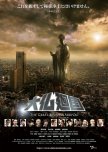
This review may contain spoilers
Don't hasten your death!
The Great Buddha Arrival is an homage/reboot of the 1934 Edamasa Yoshiro film by the same name. Part mockumentary, part documentary, part Tokusatsu, and a whole lot of strange fantasy---The Great Buddha Arrival is hard to define.In 1934 Edamasa Yoshiro created a film about the 18 meter/60 feet tall Shurakuen Buddha statue coming to life and walking to Tokyo. Destroyed during WWII, all that remains of the film are a few photos from a magazine. One of the first Tokusatsus and creative inspiration for those who would follow, fans and filmmakers decided to honor it by giving it a reboot. The movie is less than an hour long and largely crowd sourced. Blasts from the past showed up to be "interviewed" for the TV show being developed on the statue's past. Godzilla and Gamera stars of old made appearances and also Edamasa's grandson.
In the 2018 film the three photos are thought to be from a real event and a young writer is tasked with creating a tv show around them. Later he finds that they are from Edamasa's film but it was based on a real experience the director had with the walking statue. Very meta. It was thought the Buddha appeared because of the serial suicides of the 1930's, whether as a warning or a sign of hope was unknown. In a twist of fate, the statue comes to life life once again in the present and begins its walk to Tokyo. This time people aren't running and screaming and Tokyo Tower seems safe. The ghost of Edamasa appears to the writer as he follows the statue, "Don't hasten your death!" When a dead director and a walking 60 foot statue appear, I'd play heads up.
Recreated scenes imagined from the 1934 movie were done using the old school techniques from the 1930's showing the statue walking through town to match up with the photos. Some of the interviews for the tv show were fun for Kaiju geeks. The little boy from the original Gamera tells of how the walking Buddha saved him, repeating the scene from Gamera only without the giant tusked turtle, although a turtle is shown in his living room. 1954 Godzilla's Takarada Akira warns that science comes with both positive and negative consequences and the Kaiju movies of yore were cautionary tales. The one big oops was an "American" religious expert who mentioned other statues with supernatural events such as Mary Magdalene, I'm not Catholic, but I think she meant the Virgin Mary, Jesus' mother. Mary Magdalene's statues aren't usually as famous and FYI, she wasn't a prostitute. But she did bring up what would be important later in the movie-that not all statues were harbingers of doom, but could also be seen as messengers of hope.
The movie bounces back and forth with grainy black and white scenes from the 1934 film (ones recreated for this film), old (created) news reels, shots of people committing suicide in 1934, news stories that were not translated, and the current time with various people and "witnesses" being interviewed. News anchors and talking heads tried to understand what was causing the statue to walk, up to and including "dark energy" supplied by aliens. The acting throughout the scenes sufficed but not much more.
The cinematography wasn't very good and the lighting was downright bad in some scenes. The sets were about as rudimentary as you can get. Most of the money must have been saved up for the last quarter of the movie and the walking statue. I tried to cut this film some slack as it was an indie film and a fan service to honor Edamasa's lost influential work. It was very strange but also interesting.
The film's ending was stark yet offered a glimmer of hope. It took a long, pinball bouncing way to get there and I often didn't know what was real and what wasn't, but in it's own weird little way this bizarrely patched together movie had heart. The Great Buddha Arrival is probably only for hardcore Takusatsu/Kaiju fans as it does commemorate the origins of the film genre and has cameos by several actors from Tokusatsu films going back to Gojira's 1954 debut. The casual viewer will wonder why a turtle in a tank is featured during one interview, some of us will go, "that's the annoying kid from Gamera!" Never thought I'd be happy to see him again. The walking Buddha even healed those wounds.
9/1/22
Was this review helpful to you?
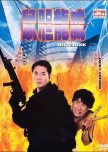
This review may contain spoilers
Yippee Ki Yay!
High Risk opens like Speed and transitions quickly to Die Hard with Jet Li playing it straight and Jacky Cheung playing it like a parody. Director Wong Jing and Jackie Chan had a falling out when making City Hunter and High Risk was Wong's payback, thinly veiling that Chan didn't do all his stunts and wasn't a great guy off screen through Cheung's character. Boy drama tops girl drama any day of the week!Jet's character started out as a cop who was unable to save his wife and son from the evil Doctor. He left the force and became kung fu star Frankie Lone's bodyguard and stunt double. Before you can say Yippee Ki Yay---Jet, Frankie, Frankie's dad (Wu Ma!), an intrepid female reporter and a cop's sometime girlfriend became trapped inside the Granadur, make that Grandeur Hotel (spell check people!) with Hans Gruber, I mean The Doctor and a zillion minions who were there to steal a priceless Russian treasure.
There were plenty of explosions, fires, crashes, bloody deaths and snakes. Yes, snakes. What bad guy doesn't bring 100 snakes to a treasure heist, you know, just in case? Always better to be prepared, right?
This movie felt like a collision itself, with Jacky Cheung playing Frankie for laughs while Jet Li channeled his best John McClane completely all business. Real world kickboxing champion Billy Chow made for a properly menacing henchman. Kelvin Wong played The Doctor over the top and was more or less forgettable. Of the women Valerie Chow made an acceptable bad girl and Chingmy Yau did well as the reporter.
One of the problems, aside from the two movies in one, was that Jet Li's Lee Git was responsible for numerous civilian deaths through his use of a car and later helicopter that created grand damage in the building and on the ground. Cheung's mugging for the camera could also wear thin. Not really sure why Wong had Cheung channel his Bruce Lee imitation with the iconic yellow and black tracksuit and fight cries when it was Chan he was trying to skewer.
Corey Yuen's fight choreography was actually first rate when it came to hand to hand or lamp to sword combat. Li's fight with Ben Lam and Cheung's fight with Chow were both entertaining and creative. The gun fights were typical 90's fare where even when multiple bad guys were using automatic weapons they still couldn't hit the hero 15 feet away...numerous times..and even failed with a flame-thrower.
High Risk was ridiculous, especially when bodies that were obviously dummies were thrown off buildings or blown up, but Wong kept the pace and carnage coming fast and furious, thank goodness he hadn't seen that franchise at this time, and the movie did keep my attention even when it didn't seem to be making any sense. I would have preferred that they kept to one mood for the movie because I enjoyed Jet Li's scenes more than Cheung's. The best part about Cheung's scenes was that Wu Ma was often in them and I have a soft spot for the old kung fu movie veteran.
Wong Jing threw everything into a blender to see what would happen so if you are a Jet Li fan or want to see a movie poking fun at Jackie Chan or are curious what a comedic Hong Kong version of Die Hard would be, this might be one to try. If you are looking for a coherent plot and consistent quality acting, best to steer clear. This bonkers film is best viewed through a generous lens.
8/17/22
Was this review helpful to you?

This review may contain spoilers
Nameless daughter in lost and found!
Reclaim is an uneven but interesting story about a 60-year-old woman who has lived her life for others. When she finds herself between a rock and a hard place with her extended family, her reaction to their needs is to look for a larger home.Ye Lan Xin's life has become one of many hats---mother, daughter, wife, friend, in-law, teacher, but none of them are truly her own. Her retired husband refuses to help around the house and uses her more like a servant. When she came home in the opening scene to find he had gone through her books telling her which ones to keep, he lost all sympathy with me. You don't mess with a person's books-that's sacred territory!
Her grown daughter soon moves back in after quitting her job and trying to start up her own company hoping for mommy's financial as well as emotional support. The daughter, too, doesn't see her mom as a person but more as an assistant and ATM. The grown son who had been educated on his parent's dime in the States, also expects her to do his bidding. When her mother who suffers from dementia once again wanders away from the nursing home, Lan Xin wants her to move into their apartment. Her husband's "antique" collection and teapot collection take up nearly a whole room but he refuses to part with anything. He even buys a champion pigeon and lets it roam freely through the house without cleaning up its mess.
Lan Xin decides to buy a larger house so everyone will have their own room. Out of all them, she has the least privacy, unable to even watch Richard Gere movies when she wants to.
Much of the movie involves Lan Xin walking up and downstairs, traveling in elevators and circling around reflecting the ups and downs in her life as she searches for an affordable home. There are a couple of fantasy scenes awkwardly imposed into the movie that don't really fit with the realistic mood and also make it difficult to know if some of the things that are shown really happened. Ultimately, what Lan Xin was looking for was herself and coming to terms with the young girl who wanted to go to Paris to study art and the older woman who had married instead and teaches art on the side. When someone asks her name she goes blank because it has been so long since anyone called her by it. The scenes of Lan Xin creating a dollhouse that resembles her home tells much of what she desires and also what she comes to learn. The movie is beautifully shot, particularly the trip she and her mother take to their home town. The music can be syrupy at times, but in this type of movie fit the mood well.
Nina Paw as Lan Xin gave a subtle performance yet quietly powerful as small clues showed through her almost imperceptible reactions. While his character could be grating with denigrating demands and opinions, Johnny Kou played the self-involved husband perfectly. The sets were all intricately designed, especially the main apartment, important since much of the action took place in the almost claustrophobic spaces as Lan Xin tried to carve out one tiny place for herself.
There are times when you will want to shake Lan Xin for letting herself be used by nearly everyone around her in her need for approval and other times you will want to cheer for her as she gains clarity. Far from a perfect movie, and too long for the subject matter Reclaim is still worth trying out to watch as one woman takes the slow journey to reclaiming her life.
"All of us are alone when we reach the end. There's nothing to be afraid of." -Lan Xin's mother
8/16/22
Was this review helpful to you?
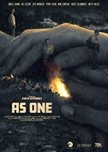
This review may contain spoilers
Lisa is a sober look at how flawed humans behave in the wake of a devastating typhoon. Politics, military conflicts, and religion make allies and enemies as the people of a small farming community seek to survive when everything they have is wiped out by a cataclysmic landslide. Though the church is buried, their faith and their faith in each other is not.The key character Ross, subtly played by Angeli Bayani, has been accused of embezzling school funds and if found guilty faces the death penalty. Her relationship with her husband has deteriorated and she is desperately seeking a new life for her and her son. The local communist rebels of which she is one is always at odds with the government's military. Despite being rebuffed by many of the villagers, she never gives up in her desire to help them. As alliances and adversaries are made, we learn more about Ross and the circumstances she has created for herself and the dangerous exit strategy she has devised.
The film follows Ross and Sister Jo as they try to bolster their people and come up with solutions to their dire situation. They are without food, shelter and medicine with no easy answers to be found. The dead need identifying and burying. Accustomed to hardships both man and nature made, the people of the village unite despite their differences to seek food and to rebuild their community. As the survivors attempts to receive aid are rebuffed by the local government because their political views are different, the residents take matters into their own hands with tragic consequences.
Filmed with mostly natural light and on a low budget, the scenes came across muted and realistic. The mountainous jungle scenery had a rough beauty of its own even with the village shattered and buried. The emotional score enhanced the scenes especially in the beginning when scarcely a word was said for the first 15 minutes.
Before watching this film, I read it is a film that has to be felt to appreciate it and I would agree with that sentiment. Lisa shows the aftermath of a natural disaster and the inadequate responses by the political and global structures in helping the people on the fringe of society. Political and military skirmishes left many trapped in the middle with few resources to find their way out. Lisa's message could be subtle and at other time's heavy handed, the pacing and narrative uneven in places but it never strayed from showing the hearts of the imperfect villagers and how they struggled together to survive and their dogged determination to rebuild.
8/6/22
Was this review helpful to you?

 32
32 98
98 7
7





















